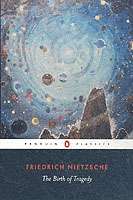The Birth of Tragedy
Out of the Spirit of Music

Editorial Penguin UK
Fecha de edición mayo 1993
Idioma inglés
Traducción de Whiteside, Shaun
EAN 9780140433395
160 páginas
Libro
encuadernado en tapa blanda
Resumen del libro
Let us turn our eyes to the highest spheres of the world that flows around us'
A compelling argument for the necessity for art in life, Nietzsche's first book is fuelled by his enthusiasms for Greek tragedy, for the philosophy of Schopenhauer and for the music of Wagner, to whom this work was dedicated. Nietzsche outlined a distinction between its two central forces: the Apolline, representing beauty and order, and the Dionysiac, a primal or ecstatic reaction to the sublime. He believed the combination of these states produced the highest forms of music and tragic drama, which not only reveal the truth about suffering in life, but also provide a consolation for it. Impassioned and exhilarating in its conviction, The Birth of Tragedy has become a key text in European culture and in literary criticism.
Shaun Whiteside's translation is accompanied by an introduction by Michael Tanner, which illuminates Nietzsche's central arguments. This edition also includes suggestions for further reading and notes.
Biografía del autor
Friedrich Nietzsche (1844-1900), filólogo y filósofo, admirador en su juventud de Schopenhauer y de Wagner es, sin duda, uno de los pensadores que más han influido en la configuración de la mentalidad contemporánea. En obras como Así habló Zaratustra, Más allá del bien y del mal o La genealogía de la moral dirige una crítica a la cultura occidental que desenmascara la contradicción de los valores en los que se inspira con la vida, y plantea la recuperación del sentido trágico según el ejemplo de los griegos.








